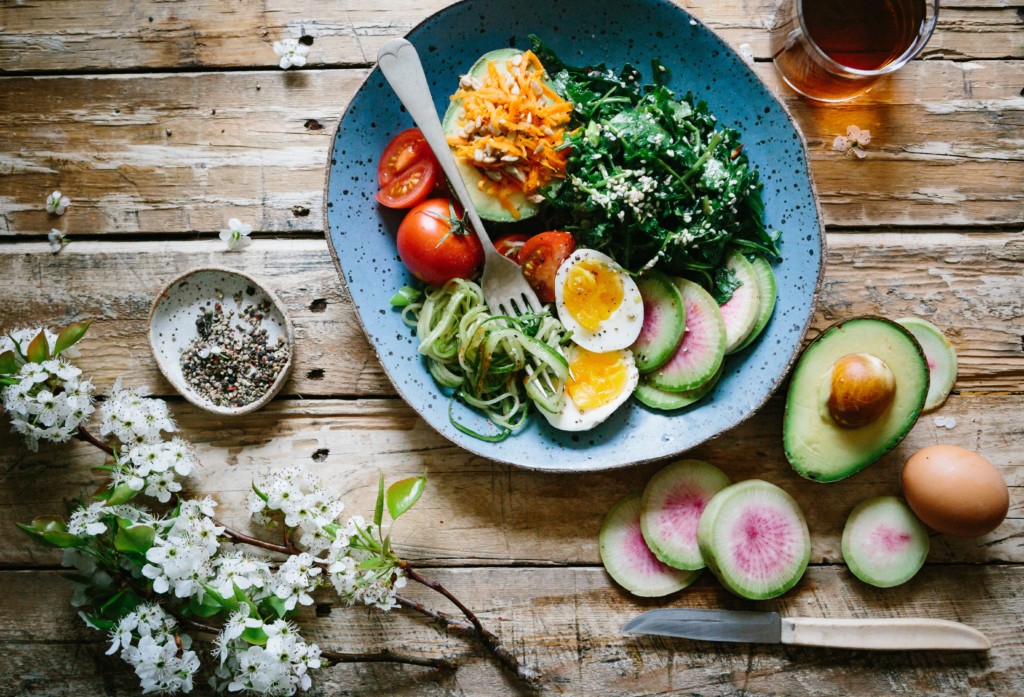
By now it’s likely that you’ve heard of the “miracle diet” that has gained visibility in the last few years, watched the popular documentary about it on Netflix, or seen incredible before-and-after shots on social media. You may know people who are “living the lifestyle” and can’t stop talking about it. Yes, folks, we’re talking about the trendy ketogenic or keto diet.
Although I’ve never been a “dieter” of any sort, I started the keto diet three months ago in hopes of healing an autoimmune condition that wasn’t responding to traditional treatment. I’m happy to report that the keto diet has had an amazingly positive impact on my health. My husband has joined me on the keto diet in solidarity and he’s thrilled with how sharp and energized he feels.
Over the last three months, I’ve gotten tons of questions from friends and family about what the keto diet is and how to get started with it. While I’m not a doctor and can’t provide medical advice, I’d like to share with you some of the information and resources I’ve compiled about the basics. Once you start researching, you’ll see that the keto diet is extremely complex and it’s easy to go down countless rabbit holes and get into nuanced debates about every aspect of the diet (from carb cycling to intermittent fasting to testing your ketones and beyond). This article is meant to provide a comprehensive overview of the diet for beginners to get you started.
Background Information
What is the keto diet?
The keto diet is a very high-fat, moderate-protein, low-carb diet. Even though it’s currently super popular, it’s not new. It’s been used for almost a century to treat diseases such as epilepsy.
How does the keto diet work?
The basic idea is that eating a low-carbohydrate/high-fat (LCHF) diet allows your body to go into a metabolic state called nutritional ketosis, where your body starts running on fat instead of glucose. Your liver releases fatty acids, which are used to make ketone bodies. The ketone bodies then go into your bloodstream and are used as an alternative fuel source. Here’s a more detailed explanation of the science.
What’s the keto diet supposed to do?
Proponents of the diet are adamant that becoming “fat adapted” (i.e., allowing your body to get into a state of nutritional ketosis by severely limiting carbs) helps you lose weight, gain mental clarity, improve blood pressure, reverse certain metabolic diseases, and reduce inflammation. The list goes on. If you ask certain keto diet adherents, you may hear that there’s nothing the keto diet can’t do!
Exactly what are you supposed to eat?
There are several tools available online to help you calculate your exact nutritional needs (see here and here), but the basic idea is that you get around 75% of your daily calories from fat, 20% from protein, and 5% from carbohydrates. This turns out to be around 20g a day of net carbs (total carbs minus fiber, which is not digested by the body). I used the MyFitnessPal app during the first month to track my food.
For the most part, people on the keto diet eat a lot of fat in the form of coconut oil, MCT oil, grass-fed butter, heavy cream, and avocado oil. They eat a moderate amount of certain nuts like macadamias and almonds, fatty meats and fish, eggs, and bone broth; and a relatively small but decent amount of high-fat dairy and certain fruits and vegetables that are low in sugar and carbs. And avocados. Lots of avocados.
What is the keto “flu” and how do you deal with it?
You may have heard of the dreaded keto “flu” and it may have dissuaded you from trying the keto diet. When you’re starting out, it’s likely you will feel bad. Very bad. For several days. You can find the specifics here, but it’s generally caused by carb withdrawal and electrolyte imbalance. You basically have to push through it until you get into ketosis, and make sure to drink tons of water that’s enhanced with salt. I use pink Himalayan salt that you can get at almost every grocery store.
How does exercise fit in?
From experience I’ve found that it absolutely is possible to exercise on the keto diet, but you must not under-eat! Make sure you’re getting sufficient amounts of fat in your diet. And take it easy on yourself at the beginning while you’re adjusting. Don’t try to start a crazy new exercise regimen while adapting to the LCHF diet. Just trust me on this. After you’ve been on it a while, you can experiment with various high-intensity and endurance activities.
Is intermittent fasting required while on the keto diet?
Once you get the hang of the keto diet, you may want to investigate intermittent fasting (IF). For many, IF seems like a natural extension of the keto diet because you truly aren’t that hungry when you’re eating such high levels of fat. There is a lot of debate as to what the ideal fasting ratios are and what you can eat/drink and still remain in a fasted state. You can find more information here.
What about “cheat” days?
The keto diet isn’t a “diet” so much as a lifestyle. And unlike with most diets, it’s my opinion that “cheat” days are pretty incompatible with keto. As of this writing, I’ve been on the keto diet for exactly 3 months to the day, and I haven’t yet deviated. Why? It’s not because I’m superhuman; I’m afraid of getting kicked out of ketosis and having to start the entire process over again. Here’s a more detailed take on “cheat” meals in the keto context. Many suggest that the longer you’re doing keto, the easier it is to get out of ketosis and get right back in, but that’s beyond the scope of this article.
Do you need to cook multiple meals every day to accommodate non-keto dieters in your family?
I don’t. While my husband and I are both doing keto, my two-year-old son is not. My general rule is to prepare meals that aren’t overly heavy in fat so I can serve them to my son. I add a much broader variety of fruits and vegetables to his diet, and I routinely supplement his meals with carb sides, like quinoa or rice. I tend to get most of the fat I need through snacks or fat coffees.
Is there a downside?
I haven’t found a lot of good research on the long-term effects of the keto diet. There’s a lot of controversy about whether the keto diet compromises heart health because of all the saturated fat and salt LCHF dieters tend to consume. I would recommend minimizing your intake of processed food, checking in regularly with your primary care physician, and getting periodic blood work done if you plan on doing this long-term.
Resources
Here’s a helpful overview of the best keto-friendly foods.
This is probably the best list I’ve seen of keto snack ideas, and below are the best keto cookbooks and websites I’ve found:
- Ketotarian is a must-read! It provides a clear and comprehensive scientific explanation of the most important aspects of the keto diet, and the recipes are mostly plant-based.
- I also really like Simply Keto. It has tasty recipes, and a full meal plan and grocery shopping list.
- Two honorable mentions (great for me because I don’t love to cook and certainly don’t have the patience to prepare elaborate meals): The One-Pot Ketogenic Diet Cookbook and The Easy 5-Ingredient Ketogenic Cookbook.
- Keto Karma is a great free resource for information and recipes (by the same author as Simply Keto).
Keto Pantry Must-Haves
Best Keto-Friendly Restaurants in Dallas
I have to modify my order at almost all these places, but eating out while on keto is certainly possible! Here are my favorite local keto-friendly restaurants:
You can pretty much eat out at any burger joint or taco place by just subbing the bun/tortilla for a lettuce wrap. Steak places are great, as are places that serve all-day breakfast (eggs and avocados are your best friends).
Conclusion
Based on my own experience for the last three months, the keto diet is an amazing tool to try if you have a health or weight loss goal in mind. While everyone’s experience will be different, I have found that this lifestyle has helped eliminate my inflammation and has gotten my energy back to pre-motherhood levels. The food is tasty, I’m not counting calories, I’m not hungry, and I don’t feel deprived. Overall, I feel great.
Of course, with all the potential benefits come some sacrifices. This diet requires a lot of discipline. For the entire first month, I tracked every single thing that I ate. You have to give up many foods that you once loved. You sometimes find yourself eating what feels like the exact same thing every day. You have to investigate menus before eating out to make sure you have keto-friendly options. Your Starbucks options are insanely limited (coffee or Americano with heavy cream, bacon & gruyere sous-vide egg bites (and even these are borderline with 9g carbs!) and unsweetened tea). You often have to modify your food orders to the extent that the people you’re eating with think you’re crazy! It is definitely a high-maintenance diet, but gets easier the longer you do it.
If you decide to go for it, good luck! Do you have any tips or resources you’d like to share? I’d love to hear from you!














This is an amazing post on the Keto diet written by a dietitian/nurse practitioner that I would recommend reading if you have any interest in the Keto diet. There is a lot of misinformation on the internet and her post is well researched, credible, and examines how it can affect all aspects of a woman’s life. https://www.thereallife-rd.com/2018/03/ketogenic-diet/
Very well written dear Melody. Thank you for sharing this incredible research.
– Taraneh
Thanks for your kind words!